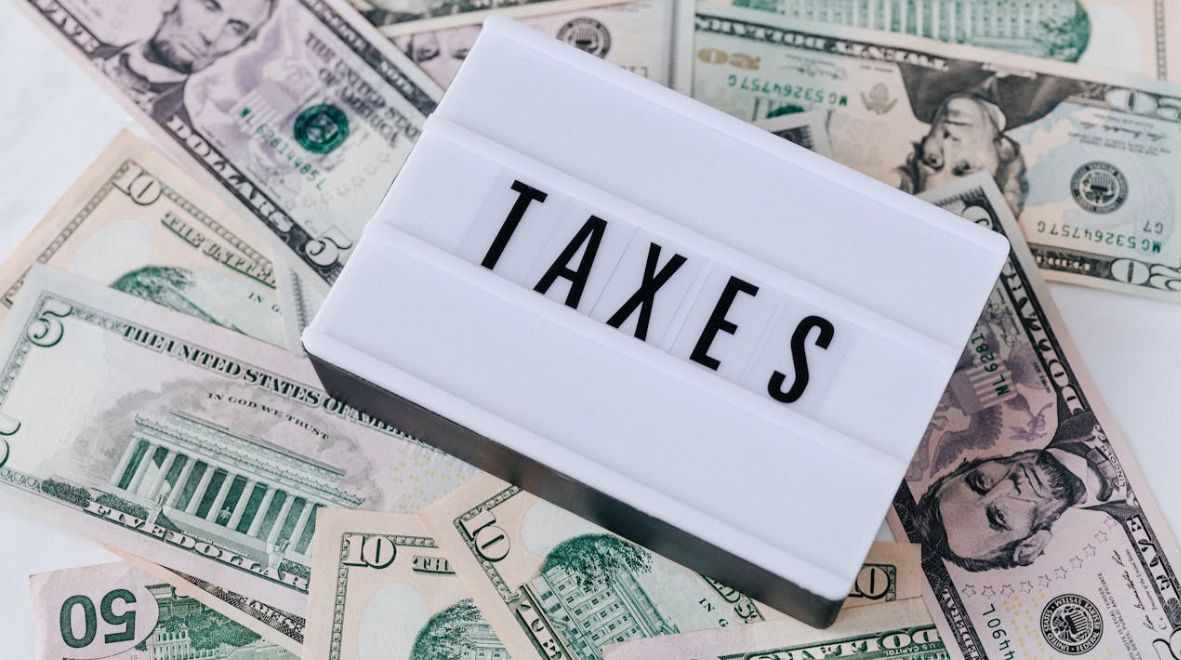Taxes in Portugal: The Ultimate Guide for 2024

CONFUSED ABOUT THE PORTUGUESE TAX SYSTEM?
You’re in the perfect place, as this article is all about taxes in Portugal. Let’s be real: taxes in Portugal can be tough to maneuver, but they don’t have to be with the right amount of information.
🇵🇹 Living in Portugal since 2020, I have had my share of tax wins and many (many) frustrations. I applied for the NHR when I arrived, which is a plus, but I also made many mistakes, including opening a business in Portugal way too early.
Even though I speak Portuguese and have help from my Brazilian husband, I’ve always felt a little lost in the Portuguese tax world. It can be hard to understand, but that’s why I wanted to create the perfect guide to taxes in Portugal.
Whether you are a newbie or a tax pro looking to understand the Portuguese tax landscape, this article covers everything from A to Z.
Ready to learn more about taxes in Portugal? Let’s go!
⚠️ Before we dive in, please note that this guide provides general information and is not a substitute for detailed legal advice. Relying solely on this guide without seeking additional advice is at your own risk, and the author is not responsible for any consequences resulting from decisions made without individual consultation.
Who Has to Pay Taxes in Portugal?
In Portugal, the following groups are required to pay taxes: residents, non-residents, and companies.

- Residents: Individuals who live in Portugal for more than 183 days in a year or have a habitual residence in Portugal are considered tax residents. They must pay taxes on their worldwide income, including from inside and outside Portugal.
- Non-residents: Individuals who live in Portugal for less than 183 days a year and do not have a habitual residence in the country are considered non-residents. They only need to pay taxes on the income they earn within Portugal.
- Companies: Businesses established in Portugal or those that conduct their primary activities in Portugal must pay corporate taxes on their profits.
Tax Responsibilities for Foreigners in Portugal
When am I considered a tax resident in Portugal?
Legally, a tax resident in Portugal is someone who spends more than 182 days there in a year (not necessarily a calendar year) or whose main residence is in Portugal.
You declare tax residency in Portugal by linking a Portuguese address to your tax number. The authorities usually accept the date you added the address as the start date of your tax residency. Only if the authorities have a reason to believe that you met the legal definition of a tax resident before, they would potentially look to change the date to the one they believe to be correct.
In cases where a person is considered a tax resident both in another country and Portugal, the “tie-breaker rules” in the tax treaty should be examined, where a person can only be a tax resident in one of these countries at any given time—we’ll talk about tax treaties below.
⚠️ MANDATORY ANNUAL REPORTING
Every tax resident in Portugal is required to file an annual report under any of the following conditions:
- They have income from abroad.
- They have a bank account abroad.
- They are registered as self-employed in Portugal (even with no income).
What does this mean? Almost every foreigner living in Portugal must file an annual report, even without taxable income. The annual report is submitted between April 1 and June 30 each year regarding the preceding year and is filed online in the AT system.
When filing, you must remember to classify the various incomes into the AT system. If the authorities disagree with the classification, you will pay the difference, with penalties. This is why I feel like having someone help you through this process is an amazing asset, but we will discuss that later on 😉.
AT stands for Autoridade Tributária e Aduaneira (Tax and Customs Authority). This government agency is responsible for tax and customs administration in Portugal.
🧾 ACCRUAL ACCOUNTING
In Portugal, tax liability is based on the “accrual accounting” method. Under this system, income is recognized at the time it is earned or accrued, not necessarily when the actual cash is received.
For example, if you invoice a client in one fiscal year but don’t receive the payment until the next year, you still report and potentially owe taxes on that income in the year you invoiced the client. This approach determines when income should be reported for tax purposes.
🌎 TERRITORALITY PRINCIPLE
The tax system in Portugal is similar to most countries worldwide and is based on the territoriality principle. Tax residents in Portugal are taxed on their worldwide income. Non-residents are taxed only on their income from sources within Portugal.
◻️ GREY AREAS
Portugal’s tax rules are based on laws, court decisions, decisions from the CAAD arbitration tribunal, European treaties, and opinions from the tax authority. However, Portugal often doesn’t have clear, organized guidelines in matters concerning international taxes.
Many international tax issues haven’t been fully addressed in laws or court cases. This lack of clarity means that even experienced lawyers often face uncertainty in these matters, as multiple interpretations of the law are possible. In some situations, the tax laws are ambiguous, and taxpayers must use their judgment (or solid legal advice). In other cases, the laws are clear and straightforward.
TAXES IN PORTUGAL
Double Taxation Treaties
Portugal has a large network of treaties (over 70 tax treaties with different countries) to prevent double taxation. When two countries agree to a treaty to avoid taxing the same income twice, they follow the rules set in that treaty. If there is a contradiction between one of the countries’ laws and the treaty, the treaty should be followed.

So how does this work exactly? Let’s look at an example of taxes in portugal for US citizens:
Imagine you’re an American who lives and works in Portugal. You earn an income from a company based in Portugal, but you’re still a U.S. citizen. Without a double taxation treaty, you would have to pay income taxes on your earnings in Portugal because that’s where you earn your income, and also in the U.S., because the U.S. taxes its citizens on their worldwide income.
However, Portugal and the U.S. have a double taxation treaty in place. Here’s how it helps:
- Income Earned: You earn €50,000 from your job in Portugal.
- Initial Taxation: Portugal taxes this income because it’s earned within its borders.
- U.S. Taxation Rules: Normally, you must also report this income on your U.S. tax return.
- Treaty Benefits: The treaty between Portugal and the U.S. specifies that you can receive credit for the taxes paid to Portugal. This prevents the same income from being taxed again by the U.S.
This treaty effectively coordinates the tax rules between Portugal and the U.S. to ensure that your income is taxed only once, not twice. This makes international working and investing much more manageable and financially sensible, removing the risk of paying double taxes on the same earnings.
TAXES IN PORTUGAL
How Much Tax Do Foreigners Pay In Portugal?
Foreigners in Portugal pay taxes based on their residency status. Non-residents are taxed at a flat rate of 25% on their Portuguese-sourced income. However, tax residents, which include foreigners living in Portugal for more than 183 days a year or those having their primary residence there, are taxed on their worldwide income at progressive rates ranging from 14.5% to 48% if no special rate applies to their specific type of income.
But it can be a little more complex than that, so let’s look at everything point-by-point. Those who come to Portugal and do not become tax residents with a special tax status will pay the following taxes (2024):
TAXES IN PORTUGAL
Income from Employment
According to tax brackets, plus a “solidarity tax” of 2.5% on income over 80,000 euros and 5% over 250,000 euros.
| Tax Bracket (Euros) | Tax Rate (%) |
| 0 – 7,703 | 13.25 |
| 7,703 – 11,623 | 18.0 |
| 11,623 – 16,472 | 23.0 |
| 16,472 – 21,321 | 26.0 |
| 21,321 – 27,146 | 32.75 |
| 27,146 – 39,791 | 37.0 |
| 39,791 – 51,997 | 43.5 |
| 51,997 – 81,199 | 45.0 |
| 81,199 and above | 48.0 |
In addition to income tax, in Portugal, there is a Portuguese social security contribution, with a rate of 11% for employees, and an employer’s social security contributions, with a rate of 23.75%.
TAXES IN PORTUGAL
Income from Self-Employment

Income from self-employment (“registered business owner/self-employed”) is taxed based on different tax brackets. Unlike being an employee, being self-employed comes with several advantages:
- A business owner who earns up to 200,000 euros per year can choose between the regular accounting method (where profit is income minus expenses, and the profit is taxed) and the “simplified accounting” method, where a fixed percentage of business expenses is set by law, assuming that the business has a certain percentage of expenses according to the type of business and only a small part of them needs to be proven (15%). For most service providers, their expenses are assumed to be 25% of total income, hence only 75% of the income is taxed.
- The aforementioned percentage is reduced by an additional 50% in the first year of the business’s existence and by 25% in the second year.
- In the first year of the business’s existence, there is a complete exemption from social security payments.
- After the first year, the social security payments are 21%, but for those who benefit from simplified accounting, only 70% of the salary is considered for social security purposes, and the payments are subject to a cap of about 1,200 euros per month. For employees, there is no cap.
The result is that in the first year, for most service providers, only 50% of 75% of the income (about 37.5% of the actual income) is considered taxable income, and there are no social security payments. Even afterward, the situation for self-employed is generally preferable for tax purposes compared to employees.
TAXES IN PORTUGAL
Income from Capital Gains
Portugal distinguishes between short-term capital gains and long-term capital gains. Short-term capital gains result from buying and selling an asset within less than a year. Long-term capital gains result from holding an asset for more than a year.
Short-term capital gains are aggregated to the income subject to the progressive rates.
For long-term capital gains, the taxpayer can choose between taxation according to tax brackets or a fixed tax rate of 28%. In the case of selling real estate in certain cases, only 50% of the gain is taxed, but always by the progressive rates.
TAXES IN PORTUGAL
Income from Dividends, Interest & Royalties

For income derived from dividends, the taxpayer can choose between tax brackets/progressive rates and a fixed tax rate of 28%. For income derived from interest, the taxpayer can choose between tax brackets/progressive rates and a fixed tax rate of 28%.
The classification of income from royalties in Portugal is not simple. For the original creator of a work, the income is considered income from a business/self-employment. For someone who has purchased the rights related to a certain work and derives royalties from it, the income is considered capital income (like dividends).
⭐️ It is important to note that royalties depend on granting the right to use the work. Depending on the situation, the sale of the work is considered a capital gain tax in Portugal or business income.
TAXES IN PORTUGAL
Income from Cryptocurrency
Profits from selling cryptocurrency are treated as capital gains and taxed when exchanging cryptocurrency for regular money (fiat). If you sell your cryptocurrency within less than a year of buying it, you’ll pay a flat tax rate of 28%.
If you hold it for more than a year, you won’t have to pay any Portugal capital gains tax on it, but only if the cryptocurrency is from a country with a tax agreement with Portugal. It’s also important to know that trading one cryptocurrency for another, including stablecoins, is not taxable.
TAXES IN PORTUGAL
Income from Rentals
How is rental income taxed? Income from long-term rentals in Portugal is taxed according to the rental period at a rate of 25% (for contracts of up to 5 years) and 5% (for contracts of 20 years and more).
Income from short-term rentals with an AL license is taxed as business income at the marginal tax rate but subject to a 65% reduction (only 35% of the income is taxed).
TAXES IN PORTUGALz
Income from Pensions

Income from pensions or pension-like payments (including executive insurance) is also subject to marginal tax rates.
It is important to note that governmental pensions related to work for the government or one of its agencies (including the army, municipalities, etc.) might have specific treatment in the tax treaties. For example, a government pension from the USA or the UK is not taxed in Portugal (unless the taxpayer is a Portuguese citizen), but a government pension from Canada is fully taxed.
TAXES IN PORTUGAL
Deductions and Credits: The Portuguese NIF
In Portugal, a system encourages individuals to register their tax number (NIF, Número de Identificação Fiscal) on purchases to benefit from tax reductions.

When making a purchase, sellers typically ask if the buyer wishes to add their NIF to the invoice. These tax reductions are calculated at the year’s end and are categorized based on the type of expenditure, such as general purchases, health services, education, and more.
Obtaining a NIF as an Individual
For regular residents and citizens, obtaining a NIF is straightforward. Individuals can apply through the local tax office (Finanças) or online via the Portuguese tax authority’s website. A NIF is essential for various daily activities, including employment, opening a bank account, and making qualified purchases that could lead to tax deductions.
NIF for Businesses
Businesses must also obtain a NIF when they are established. This number is used in all fiscal documents and is crucial for filing taxes, claiming deductions on business-related expenses, and maintaining compliance with Portuguese tax law. Businesses can apply for a NIF through the same channels as individuals.
The inclusion of a NIF on invoices not only allows businesses to track and claim expenses accurately but also aids in ensuring transparency and adherence to tax regulations.
This system of registering and using the NIF helps maintain fiscal transparency, supports tax compliance, and promotes economic fairness by ensuring that all economic activity is appropriately recorded and taxed.
While the reductions are not great, they can reach up to €2,000. However, these reductions do not apply to income under the Non-Habitual Resident (NHR) program. Speaking of the NHR program, you’re probably wondering if it still exists in Portugal. We will address that next.
TAXES IN PORTUGAL
Is Portugal Canceling the NHR?
Yes, Portugal ended the Non-Habitual Resident (NHR) tax regime on December 31, 2023.

Although Portugal’s NHR program was canceled, it still applies to everyone with the status and people arriving in 2024 who meet certain conditions.
What are these conditions?
- Those who have a promise of an employment contract signed until December 31, 2023, whose duties must take place within Portugal. The employment itself does not need to take place in 2023.
- Lease or another contract granting right of accommodation in Portugal concluded until October 10, 2023; Note – we interpret this as including a “comodato” – an agreement for free dwelling.
- Reservation contract or promissory contract for the acquisition of real estate concluded by October 10, 2023;
- Enrolment or registration for dependents, at a school in Portugal, completed by October 10, 2023;
- Residence visa or residence permit valid until December 31, 2023;
- Procedure, initiated by December 31, 2023, of granting a residence visa or residence permit, with the competent entities, in accordance with the current legislation applicable to immigration matters, namely through the request for an appointment or actual appointment for submission of the request for the granting of a residence visa or residence permit or, also, by submitting the request for the granting of a residence visa or residence permit.
- Members of the households of people who meet the criteria above.”
There is a lot of information on the internet, and in most cases, it is inaccurate about how the program works. In practice, it is a very complex program that applies differently to different people, depending on their income, profession, and location. This guide will provide detailed information on how the program works.
TAXES IN PORTUGAL
What will replace the NHR in Portugal?
the government has created a new program – Tax Incentives for Science, Research and Innovation (TISRI) – whose benefits are very similar to the NHR program (even if not identical), but access to it is open only to certain people.
At this stage, the program is still shaky, with operational parts of the program still not working as they should. But don’t worry, we’ll explain the program will be explained a little further down.
TAXES IN PORTUGAL
Tax Liabilities for NHR Holders
The NHR offers significant tax advantages for qualifying foreign residents. However, NHR holders still face specific tax liabilities that should be explained more to ensure compliance with Portuguese tax laws.
Income from Employment

The expression “work abroad” causes much confusion for people coming to Portugal who believe they can continue to work at their job with a foreign contract and receive a salary that the NHR will cover.
Indeed, the NHR program grants a full exemption from paying tax for work abroad that is taxed abroad, but this situation is largely theoretical.
What does that mean exactly? According to the tax treaty, “work from abroad” refers only to work physically done abroad. A tax resident in Portugal can continue to work for a foreign employer only if all the work is done outside of Portugal. Of course, this is a rare situation that seldom occurs.
If you work in Portugal, Portugal has the right to tax your income, even if you’re mistakenly taxed in another country where the money comes from. So, if you’re a tax resident in Portugal and work for a foreign company, you might end up paying taxes twice, which the treaty tries to avoid. Generally, you’ll likely be taxed in Portugal most of the time.
The NHR program also benefits work done in Portugal, provided it is done in required professions (high-value activities). The list of required professions was last updated in 2020 (actually, it was updated twice in 2020, a few months apart, and both the old and new lists are circulating on the internet). This is the current list.
The special tax rate is 20%, and you can choose between it and the marginal tax. It is important to remember that the NHR program deals with income tax, and the preferred rate (20%) does not include social security contributions (11% for employees and 23.75% for employers).
TAXES IN PORTUGAL
Income from Business (Self-employed, Not a Company)

Income from self-employment outside Portugal is exempt from income tax in Portugal under the NHR under the following conditions:
- If it is in required professions (High Value Activities).
- The country where the work is done has the right to tax the income according to the relevant tax treaty or according to the OECD model treaty if there is no relevant treaty. Commonly, the source country will only have rights over this income if the services have been provided locally in a “permanent establishment.” Effective taxation is not required.
- The country where the work is done is not on Portugal’s “blacklist” for tax havens.
- These conditions are rarely met, mainly in cases of “digital nomads” who are tax residents in Portugal but actually work from various places around the world, noting that, even in the case of digital nomads, the condition of a “permanent establishment” must be met.
- Income from a business in Portugal is taxed at the special tax rate of 20%, but only insofar as the work is in a preferred profession/high-value activity. In the case of income from self-employment, part of which is accrued in Portugal and part outside Portugal, it is possible to divide the time pro rata.
⚠️ It is important to note that NHR holders also benefit from the first-year exemption from social security and the coefficient reduction (50% in the first year and 25% in the second).
TAXES IN PORTUGAL
Income from Capital Gains
Wondering about capital gains tax in Portugal? Under the NHR program, capital gains income is included.
If you make money from selling physical property (like a home or an office) in a country with a tax treaty with Portugal (even if it’s on a blacklist) or a country without a treaty and not on the blacklist, Portugal won’t tax you on those gains. This is because most tax treaties give the right to tax the country where the property is located.
On the other hand, when it comes to capital gains from other assets, usually, the other country does not have the right to tax, and therefore, there is no exemption under the NHR. So, for example, a Canadian will pay tax in Portugal for the sale of shares.
An interesting issue arises when the expat in Portugal is an American citizen. Due to the saving clause, the USA has the right to tax all types of income of its citizens. Thus, according to the law’s letter, Americans’ capital gain income should be exempt from tax under the NHR.
In practice, as of the date these lines are written, the tax authorities in Portugal claim they have the right to tax and also actually collect the tax. This is even though in 2022, they lost in an arbitration court, and it was determined that capital income is exempt from tax for Americans under the NHR.
TAXES IN PORTUGAL
Income from Dividends, Interest, Real Estate, and Royalties for Intellectual Property
And dividend tax Portugal or property taxes in Portugal for foreigners? Income from dividends, interest, real estate, and royalties coming from a country with which there is a tax treaty (even if it is on the blacklist) or a country that does not have a tax treaty and is not on the blacklist is almost always subject to the right to tax in the country from which the income comes. Therefore, it will be exempt from tax in Portugal under the NHR.
It is important to remember that the exemption also applies when the country from which the income comes does not actually collect tax. For example, income from interest or dividends from the UK is not subject to tax in Portugal. The UK has the right to tax this income but does not actually collect tax.
TAXES IN PORTUGAL
Income from Cryptocurrency

Income from cryptocurrency is not regulated under the NHR; therefore, it follows the same logic as the income classifications they pertain to (capital gain, capital income, etc.).
TAXES IN PORTUGAL
Income from Pension
Income from pensions for those who became tax residents before April 2020 is taxed at a rate of 0%. Under the NHR, the rate is 10% for those who became tax residents after 2020.
TAXES IN PORTUGAL
Tax Liabilities for TISRI Holders
The TISRI program is quite similar to the NHR program. Still, it is limited to a very limited number of professions (such as university lecturers and certain research workers with a doctorate), workers of approved startups, or tax residents in the islands of Portugal according to criteria to be defined later by the islands.
The startup approval process and criteria for the program are still being figured out, so it’s really hard to join right now. Hopefully, they’ll finish setting up the system soon so more people can access it.
The main differences between the TISRI program and the NHR program are that under the TISRI program, all types of capital income from abroad from countries not on the blacklist are exempt from tax regardless of the right to tax of the foreign country. Thus, capital gains are also exempt. On the other hand, a pension is not covered by the program and is taxed at full marginal tax rates (except for a government pension under certain circumstances).
TAXES IN PORTUGAL
What is VAT?
Value Added Tax (VAT), known in Portugal as “IVA” (Imposto sobre o Valor Acrescentado), is a consumption tax applied to the value added to goods and services. The standard VAT rate in Portugal is 23%, with reduced rates applicable to certain goods and services, such as food, books, and pharmaceutical products.

Businesses collect this tax on behalf of the government. It is the consumer who ultimately bears the cost.
If you own a business in Portugal, you can claim VAT (also known as sales tax in Portugal) on the goods and services you purchase for your business operations. This process is known as VAT recovery or input VAT deduction. Here’s how it works:
- VAT on Purchases: When your business buys products or services that include VAT, you pay the supplier the price of the goods plus VAT.
- VAT on Sales: When you sell goods or services, you charge VAT to your customers and collect it on behalf of the tax authority.
- Deducting VAT: When you file your VAT tax returns, you can deduct the VAT paid on your business purchases from the VAT collected on sales. This means you only need to remit the difference between the VAT collected on sales and the VAT paid on purchases to the tax authorities.
This mechanism prevents the same goods or services from being taxed multiple times as they move through the supply chain and ensures that VAT is a tax on the end consumer, not businesses. However, you must keep accurate records and valid invoices for all transactions to claim VAT deductions.
In certain cases, VAT should not be charged, such as in the case of selling services to another business outside of Portugal or, in some cases, of selling services to individuals outside the EU covered by a specific exemption
TAXES IN PORTUGAL
Tax Planning
Portugal is fertile ground for tax planning at various levels of creativity. The main tax planning relates to income classification, in cases where there is flexibility in classification, and to the timing of withdrawal of funds, in cases where there is flexibility regarding the timing of withdrawal.
Thus, when a person has employment income, he usually has three options: (1) employment as an employee, (2) self-employment, or (3) through a company he owns.
Each of these options leads to different tax outcomes.

Among other things, a popular tax plan is working through a foreign company that pays profits as an alternative to working as an employee or self-employed. Since profits from a foreign company are exempt from tax under the NHR, operating a foreign company in a country where the tax rate is low (or zero) and which is not on the blacklist can lead to a very low tax.
Such tax planning may sound simple, but in practice, it can lead to higher tax. For example, a foreign company whose effective management is in Portugal may be considered a tax-resident company in Portugal through a permanent establishment.
The result would be corporate tax in Portugal for the company and dividend tax in Portugal at the individual level.
TAXES IN PORTUGAL
Fresh Portugal: Expat Lawyers
Tax planning is highly recommended, but it is important to remember that it is a complex matter that skilled professionals should handle.
That is why I wanted to add a small section in this article to discuss Fresh Portugal, who are tax lawyers in Portugal. I originally met Zeev Fisher, the founder of Fresh Portugal, at the Nomad World Fest in Albufeira in 2023. I was personally blown away by how eloquently he spoke about such a complicated (and frustrating) topic. I even got to chat with him afterward to ask him some questions about my tax situation in Portugal.
🌟 And let me tell you, he only shared nuggets of gold.
Living in Portugal can be hard, and finding the right people to help in a country where you might not speak the language or know the laws is even harder. Fresh offers holistic and creative legal solutions, from planning to filing and managing disputes.
The best part? They are reliable firm that responds to emails quickly (if you know you know), and provides specific services for any need.
⭐️ Plus, if you are looking for a Portugal tax calculator for foreigners, they have a handy tool you can check out here.
Taxes in Portugal: Frequently Asked Questions

How much tax do you pay in Portugal?
In Portugal, tax rates for individuals vary depending on income. The progressive rates range from 13.25% for incomes up to €7,703 to 48% for incomes above €81,199.
TAXES IN PORTUGAL
Is Portugal highly taxed?
Portugal is considered moderately taxed compared to other European countries. The top income tax rate is 48%, comparable to many other EU countries. However, the overall tax burden is influenced by various factors, including VAT rates and social security contributions
TAXES IN PORTUGAL
Can you live in Portugal tax free?
It depends— If your income is pure passive income from foreign sources and you are under NHR, or crypto held for long periods of time, or government pension from certain countries, you can live tax-free in Portugal.
For those working from Portugal, Portugal is not a tax-free country. However, there are favorable tax regimes such as the NHR program which, although it has ended, allowed certain residents lower tax rates. Its successor, TISRI, still offers benefits.
TAXES IN PORTUGAL
What is the 10-year tax rule in Portugal?
Portugal does not have a specific Portugal tax-free 10 years rule that exempts individuals from tax. However, Portugal had a Non-Habitual Resident (NHR) program, which provided tax benefits for a period of ten years. Although this program has ended, it offered reduced tax rates on certain types of income for eligible expatriates.
TAXES IN PORTUGAL
Can I live in Portugal and not be a tax resident?
Yes—you can live in Portugal and not be a tax resident if you spend less than 183 days per year in the country and do not have a habitual residence there. Tax residency is primarily based on the amount of time spent in Portugal and having significant residential ties to the country.
TAXES IN PORTUGAL
What triggers tax Residency in Portugal?
Tax residency in Portugal is triggered if you spend more than 183 days in the country within a calendar year or if you have a permanent home in Portugal at any time during the year that is habitually maintained as your residence. Having significant personal and economic ties to Portugal can also establish tax residency.
Final Thoughts: Taxes in Portugal
And there you have it—everything you need to navigate the intricate world of taxes in Portugal. Whether you’re planning to move, already living here, or just curious, this taxes in Portugal guide has you covered.
Remember, the tax landscape can be complex, so always consider seeking professional advice tailored to your unique situation. With the right knowledge and resources, you can manage your tax responsibilities confidently and enjoy the many benefits of living in beautiful Portugal.
Happy tax planning!



